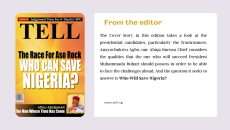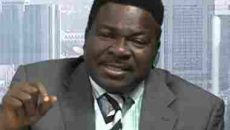After being buoyed by a 2-0 win over Congo in Point Noire, no one could realistically foresee the Super Eagles’ hope of defending their African Cup of Nations, AFCON, title come to a screeching halt in their drawn game against South Africa in Uyo on November 19.
It is quite a shame that Nigeria will not be defending the title it won in South Africa next year in Equatorial Guinea, despite two second half goals from Hull City’s Sone Aluko on November 19. After Egypt, Nigeria will be the second nation that has failed to defend its AFCON title.
And so continues a see-saw run, after the Eagles reached the pinnacle of coach Stephen Keshi’s three-year tenure as coach, with a second round finish at last summer’s World Cup in Brazil.
President Goodluck Jonathan was well intentioned when he reinstated Keshi, after the Nigeria Football Federation, NFF, ignominiously sacked him a few weeks ago. But after Wednesday’s lack-luster performance against South Africa, I have to ask my good friend, what next?
I have known Keshi for more than three decades now. In fact his wife and I grew up in the same neighborhood in Benin City. And her patriotic spirit convinced him to pick the Nigeria job instead of going to Gabon, when the NFF approached him with the Super Eagles coaching contract more than three years ago. My family also hosted him to a party in the San Francisco Bay area attended by another great Nigerian defender Godwin Odiye, who helped arrange for Keshi’s troublesome knee injury then to be diagnosed by the orthopaedic surgeon of the San Francisco 49ers, to enable him make the Super Eagles squad for the 1994 World Cup. That is how strong our friendship goes.
Beginning with Otto Gloria in the early 80’s I have also known and interacted with a number of foreign and indigenous Nigerian coaches including Clemence Westerhof, Paul Hamilton, Tunde Disu, Manfred Hoener, Adegboyega Onigbinde, Shuaibu Amodu, Fanny Amun, Daniel Amokachi, Christopher Udemezue, Bora Milutinovic, Patrick Ekeji, Carlos Alberto Torres, Samson Siasia and off course Keshi, since his New Nigerian Bank days.
And the fact that Nigeria has had this number of coaches and more shows how uncertain and difficult the job is. Sometimes you are only remembered by your last victory, and at other times you may not even have the chance to prove your professional pedigree as was in the case of Alberto Torres, captain of Brazil’s 1970 World Cup squad, who because of contractual hiccups, quit the job a few days after I interviewed him in Boston during the US Cup in 1995. Considered one of the best defenders of all times, Torres quit the Eagles job barely two weeks after he was hired.
However, the good thing going for Keshi is his love for Nigeria has been a catalyst against most of the challenges he has faced. And that is why we have to cut the man some slack, because he has done a decent job in the three years he has been on the job and has fulfilled some of the managerial talents that Westerhof (Nigeria’s most successful foreign coach in recent times) identified in Keshi when the Dutchman became the Eagles coach in 1989.
No doubt, Keshi has failed to meet some of the expectations in a very demanding atmosphere where foorball is almost like a religion. But some of the blame should also go to the NFF, which in the last four months has been embroiled in a leadership tussle, a recurring pattern in the administration of football that has certainly not helped Keshi meet his goals.
We also have to remember some of the challenges he has had to contend with ranging from boardroom drama, extended periods without a salary and contract, a lot of intrigues, sacrificing three consecutive Christmas holidays away from his family in California and internal wrangling with certain players including Ikechukwu Uche and Osaze Odemwingie.
But like former Manchester United coach, Sir Alex Ferguson, emphasized in a recent Harvard Business Review (a publication I shared with Keshi) a coach has to set high standards and hold everyone accountable to them.
“There are occasions when you have to ask yourself whether certain players are affecting the dressing-room atmosphere, the performance of the team, and your control of the players and staff. If they are, you have to cut the cord,” said Ferguson in the 2012 Harvard Business School study by Professor Anita Elberse.
It is to his credit that the Big Boss rescinded disciplinary actions against Odemwingie before the World Cup in Brazil and Uche a few weeks ago, not because of outside pressure but simply for the fact that these two players were now more team-oriented.
By the mere fact that he won last year’s AFCON tournament when even the NFF did not give him a chance, Keshi has proved that he is Nigeria’s most successful indigenous coach in the last two decades. I am sure most people don’t know that the football authorities had already booked return tickets home for the team before last year’s final, on the assumption that the Super Eagles would not make it beyond last year’s semi-finals.
With last week’s results and with no tournament on the horizon, Keshi is now definitely faced with a situation that is out of his control, and the status of his future as coach of the Super Eagles is clearly in doubt.
So what next for Big Boss? If it is the Keshi I know I am sure he is already thinking of returning to his beautiful wife and four lovely children and perhaps a new coaching challenge.
And I think that may be the right solution for everyone in this matter. Begin anew.
Sometimes moving on is the best solution to an intractable situation, and I am sure my good friend, who has sacrificed so much for Nigeria, will find a better and less stressful job.
Whatever the future holds for Nigerian football with Keshi or someone new at the helm, I would advise our football folks to put all acrimony aside, revamp the administrative side of the game and focus on the eight principles that has made Sir Alex Ferguson one of the most successful coaches of all time:
*Start with the Foundation
*Dare to Rebuild Your Team
*Set High Standards—and Hold Everyone to Them
*Never, Ever Cede Control
*Match the Message to the Moment
*Prepare to Win (Always)
*Rely on the Power of Observation, and
*Never Stop Adapting
Follow Us on Social Media


 WhatsApp us
WhatsApp us